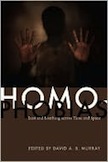 Homophobias: Lust and Loathing across Time and Space
Homophobias: Lust and Loathing across Time and Space
by David A. B. Murray
Duke University Press. 240 pages, $22.95
IN THIS TWO-PART COLLECTION of nine essays, editor David A. B. Murray successfully illuminates what one contributor, Don Kulick, refers to as “the history of homophobic values,” exposing how the universality of homophobia manifests and disseminates itself in heterosexist systems and becomes institutionalized. Each contributor offers a unique take on how anti-gay rhetoric and images of hegemonic privilege develop through a myriad of political, economic, and linguistic instrumentalities.
Constance R. Sullivan-Blum’s essay, “It’s Adam and Eve, not Adam and Steve: What’s at Stake in the Construction of Contemporary American Christian Homophobia,” for example, searches for the ideological roots of evangelical Christian values. The author’s field research on evangelicals’ attitudes toward gay marriage demonstrated that their discourse on homosexuality is anchored in the idea that “two halves make a whole,” halves paired as an opposition such as night and day, heaven and earth, or man and woman. The pairing of like objects, such as two men or two women in sex or marriage, is seen as a disturbance of the divine order, which is why evangelicals refer to gay marriage as a mocking of God’s plan.
Brian Riedel’s piece, “Stolen Kisses, Homophobia as ‘Racism’ in Contemporary Urban Greece,” offers a linguistic interpretation of homophobia in that country. He notes that activists in Greece use the term “ratsismos”—racism—to characterize homophobia, rather than simply “omofilofovia,” which would be the equivalent to the English word. The Greek approach takes issue with the Western notion of homophobia as a psychological problem and prefers to see it as a deeply rooted cultural bias that seeks to isolate GLBT people as a discrete class, one that’s subject to discrimination by the majority.
Suzanna LaFont’s chapter, “Not Quite Redemption Song: LGBT Hate in Jamaica” argues that Jamaicans perceive Western influence as a threat to their identity and an emasculation of their country. The concept of gay equality and gay rights is viewed as a Western import and is thus associated with moral corruption and impurity. The island nation of Barbados, as Murray points out in “Homo Hauntings: Spectral Sexuality and the Good Citizen in Barbadian Media,” exhibits a similar rejection of European and American values: “moral decay is linked to the ‘feminization’ of the economy and public life, domains which are perceived to be traditionally heterosexual and masculine.” The legitimization of homophobia allows Jamaicans and Barbadians to claim a moral superiority over other, much larger countries. In an essay called “Can There Be An Anthropology of Homophobia?” Don Kulick sums up this phenomenon: “the expression of distaste for or hatred of homosexuals is a resource people draw on to secure a sense of themselves as heterosexuals.”
Homophobias provides a much-needed perspective for bringing the reader to a more objective understanding of the mechanics of GLBT hatred and rhetoric in other times and places. By creating an anthropology of homophobia and addressing this provocative discourse head-on, Murray has invoked a number of thorny questions: How can we explain the universality of homophobia? What is it about homosexuals that has such a profound and disturbing effect on virtually all societies, regardless of race or religion? In addition, the appearance of this anthology hints at the need for a corresponding collection with pieces on the anthropology of gay identity and personhood in various societies, seen through a gay lens rather than through that of the oppressor.
________________________________________________________
Brian Stachowiak is a doctoral candidate in gay-centered depth psychology at the Pacifica Graduate Institute.





